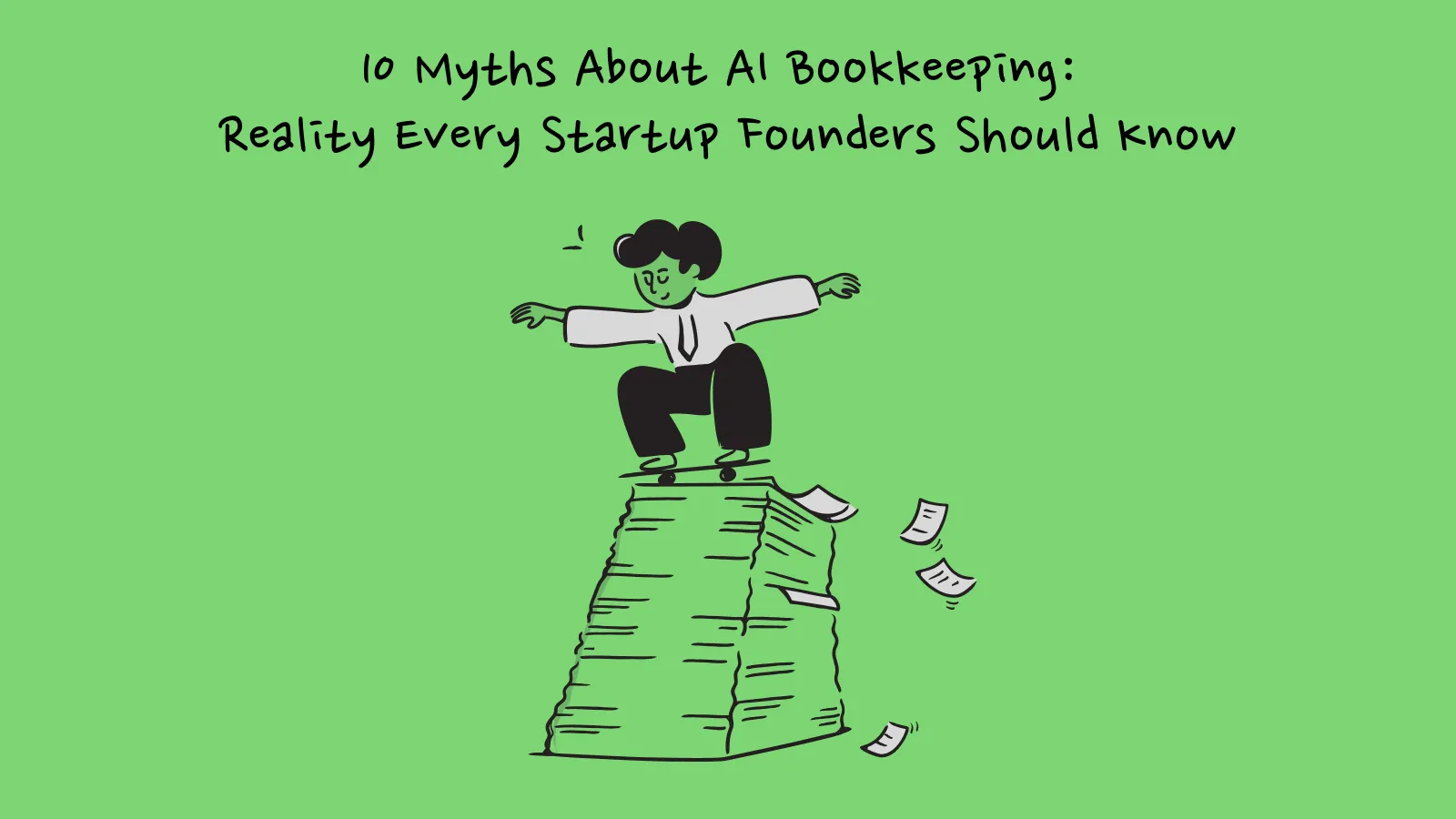10 Myths About AI Bookkeeping: Reality Every Startup Founders Should Know

AI is reshaping bookkeeping. But many startups are still making decisions based on outdated ideas or assumptions. This hesitance is born out of these myths where founders worry about losing control and replacing their bookkeeper because of AI.
Discussing and busting these myths are important because bookkeeping affects more than monthly reports. It impacts tax readiness, investor communication, cash flow planning, and the accuracy of every number used for growth decisions.
When myths spread, founders either expect too much from AI or underestimate what it can actually do. Both lead to poor choices.
This article brings clarity by breaking down the most common myths about AI in bookkeeping. Each myth is explained in simple terms, followed by the truth that shows how AI and manual bookkeeping fit together. The goal is to help founders understand what AI can handle, where human judgment is still essential, and how both support a reliable finance setup.
So, let’s get stared.
Myth 1: AI Will Replace Human Bookkeepers Completely
Let’s take the elephant in the room head-on. Many founders believe that AI has become advanced enough to take over bookkeeping entirely. The idea often comes from seeing AI automate tasks like categorizing expenses or matching bank entries. This creates the belief that a human bookkeeper will soon be unnecessary.
Truth
AI automates repetitive work, but it cannot replace the judgment, context, and interpretation that a human bookkeeper provides. Startups deal with irregular payments, exceptions, adjustments, and transactions that depend on intent rather than rules. AI cannot understand these scenarios on its own. A human bookkeeper reviews edge cases, prepares items for tax filing, handles compliance decisions, and guides founders through anything that affects reporting or planning. Automation improves speed, but accuracy and context still depend on people.
Myth 2: AI Bookkeeping Is Only Useful for Large Companies
Some founders believe AI bookkeeping tools are meant for large teams with complex financial systems. They assume automation requires scale, heavy setup, or enterprise-level processes, so early-stage startups often dismiss AI as something they will adopt “later.”
Truth
AI is most helpful for startups because it removes the routine work that early teams struggle to keep up with. It handles categorization, matching, and basic updates without adding headcount or extra hours. Modern tools connect directly to bank accounts and existing systems, so founders get cleaner books with almost no setup time. Instead of being built for large companies, AI works best for lean teams that want accurate, updated numbers without spending time on repetitive tasks.
Myth 3: AI Can Handle All Bookkeeping Without Human Oversight
Founders sometimes expect AI to run bookkeeping end-to-end with zero review. Because automation looks smooth on the surface, it creates the impression that the system can manage every entry, every exception, and every adjustment without help.
Truth
AI depends on clean, predictable data. When transactions follow a simple pattern, the system performs well. But startups rarely operate in a perfect pattern. Irregular payouts, multi-step approvals, partial payments, or unusual charges still require a human bookkeeper to confirm how they should be treated. A person checks mismatches, corrects entries that AI interpreted incorrectly, and ensures compliance before numbers move into reports or filings. AI handles the volume, but accuracy still requires oversight.
Myth 4: AI Bookkeeping Is Difficult to Use or Set Up
A common belief among founders is that AI tools require technical knowledge or complicated onboarding. Some worry that integrating automation will interrupt their current workflow or create more work for their already thin team.
Truth
Modern AI bookkeeping tools are built for quick adoption. They connect directly to bank accounts, payment systems, and existing software with simple authorizations. Once connected, the system starts categorizing entries, matching transactions, and updating summaries without any extra configuration. Most founders see updated numbers within minutes, not days. Instead of adding complexity, AI removes steps and reduces the manual effort required to keep books current.
Myth 5: AI Bookkeeping Tools Are Not Secure
Some founders avoid AI bookkeeping because they believe storing financial data in automated systems increases the risk of leaks or unauthorized access. The assumption is that automation exposes sensitive information more than traditional workflows.
Truth
Reputable AI bookkeeping platforms follow strict security practices that protect financial data at every step. Encryption is applied during storage and transfer, access is restricted to authorized users, and activity logs track how data is handled. These systems also comply with privacy rules that govern financial information. In many cases, AI tools provide stronger security than spreadsheet-based workflows or email-driven document sharing. Founders get the benefits of automation without compromising safety.
Myth 6: AI Always Produces Error-Free Results
Some founders assume that once AI is in place, every transaction will be categorized perfectly and every entry will be accurate. The belief is that automation removes the possibility of mistakes entirely.
Truth
AI reduces errors but cannot eliminate them. The system depends on the data it receives, so mistakes happen when entries are irregular, incomplete, or do not match expected patterns. If the input is wrong, the output will be wrong. A human bookkeeper is still needed to review unusual items, correct misclassified transactions, and confirm treatments during month-end. AI improves consistency, but accuracy still relies on oversight and clean data.
Myth 7: AI Removes the Need for Financial Judgment
A common assumption is that AI understands the business deeply enough to make the right decisions automatically. Some founders believe automated reports and analyses can replace the insights they would get from a human bookkeeper.
Truth
AI processes data, but it does not understand intent, context, or the reasons behind the numbers. Financial judgment involves interpreting patterns, anticipating risks, and understanding how decisions impact taxes, margins, or future cash flow. These are tasks that require human experience. A human bookkeeper helps founders understand how numbers connect to real situations, explains unusual movements, and provides clarity for planning. AI supports the workflow, but strategy and interpretation remain human-led.
Myth 8: AI Will Cause Job Losses in Bookkeeping
Some founders worry that introducing AI into their finance workflow will make human bookkeepers unnecessary. This creates a fear that automation pushes people out of the process entirely.
Truth
AI takes over repetitive tasks, not specialized work. Human bookkeepers handle reviews, corrections, adjustments, and entries that depend on judgment. They also guide founders through tax treatment, compliance questions, and planning decisions. When AI removes routine work, bookkeepers shift to higher-value tasks that improve accuracy and support growth. Instead of replacing human bookkeepers, AI makes their work more efficient and helps startups get better results with fewer delays.
Myth 9: AI Bookkeeping Tools Are Too Expensive
Many founders assume AI bookkeeping tools cost more than traditional workflows. The belief comes from comparing automation to full-service bookkeeping or assuming that AI platforms require enterprise-level budgets.
Truth
AI reduces the hours spent on repetitive tasks, which lowers the overall bookkeeping cost. It minimizes manual data entry, speeds up reconciliation, and keeps the books updated throughout the month, reducing the need for catch-up work. When founders compare the cost of manual work, rework, and delayed reporting with automated processing, AI often becomes the more affordable option. For most startups, the return on time, accuracy, and operational efficiency far outweighs the subscription cost.
Myth 10: AI Can Fully Automate Bank Reconciliations and Complex Tasks
Some founders believe AI can manage every part of reconciliation, including tricky adjustments, multi-entity activity, and entries that require interpretation. This leads to the expectation that complex workflows can run without human involvement.
Truth
AI handles a large part of reconciliation by matching transactions, flagging mismatches, and identifying missing documents. But complex scenarios still require judgment. Multi-currency flows, payouts split across accounts, vendor disputes, partial payments, or revenue adjustments cannot be resolved by rules alone. A human bookkeeper reviews these items, confirms the correct treatment, and ensures the books remain accurate. AI speeds up the process, but precision in complex cases still depends on a person guiding the final outcome.
Why Choose Inkle as Your Bookkeeping Partner
Startups need a system that stays fast without losing accuracy. Inkle gives founders both by combining AI for routine work with a human bookkeeper who reviews exceptions, handles complex entries, and keeps filings aligned with the latest rules. This balance helps teams stay updated throughout the month while avoiding the mistakes that come from relying on automation alone.
AI in Inkle runs in the background, reading transactions, matching statements, organizing receipts, and updating summaries. Founders get visibility into spending and revenue without waiting for manual checks. When something needs interpretation, a human bookkeeper steps in to confirm the treatment, correct irregularities, and prepare items that affect tax filing or investor reporting.
Founders choose Inkle because it supports the entire bookkeeping flow from start to finish:
- A reliable mix of automation and human review
- Faster monthly closes with fewer delays
- Clean, real-time dashboards for cash flow tracking
- Proper handling of multi-currency and cross-border activity
- Alerts for mismatches, missing documents, and unusual patterns
- A human bookkeeper who ensures accuracy before filings or investor updates
Book a demo to see how AI bookkeeping workflow operates in real time. The session walks through each step of how AI manages predictable tasks and how a human bookkeeper handles everything that needs context or judgment. It shows exactly how Inkle keeps your books clean, fast, and ready for audits or diligence.
Frequently Asked Questions
Why do so many myths about AI in bookkeeping still exist?
AI moves fast, and many founders rely on outdated information. Older tools were harder to use and less accurate, which created ideas that no longer apply. Some myths also come from assumptions rather than real experience with modern systems.
Can AI bookkeeper understand the intent behind tricky transactions?
No. AI identifies patterns but cannot understand purpose or business-specific logic. When a transaction needs interpretation, a human bookkeeper still decides how it should be recorded.
Does AI reduce the time founders spend on bookkeeping?
Yes. AI removes most of the repetitive work such as coding entries, matching statements, and organizing receipts. Founders still need reviews for irregular cases, but the overall workload drops significantly.
Is AI bookkeeping reliable for startups with fast-changing spending patterns?
AI works well when patterns stay stable. If spending changes often or new vendors appear regularly, a human bookkeeper needs to review entries to keep the books accurate.
Can AI bookkeeping help prevent compliance mistakes?
AI flags issues such as mismatches, missing documents, or unusual activity. But compliance decisions depend on updated rules and context, which require a human bookkeeper to verify before filing.
What’s the best way to combine AI and manual bookkeeping?
Let AI handle repetitive tasks and let a human bookkeeper review exceptions, adjustments, and anything that affects filings or investor reports. This gives founders the speed of automation without risking accuracy.



.webp)
